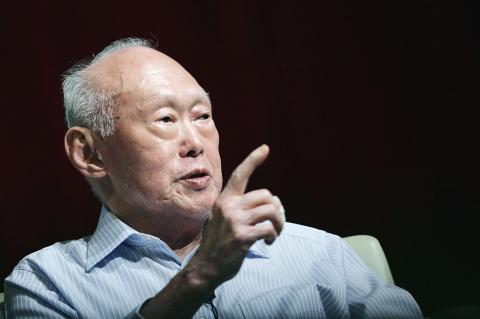Singapore’s founding father Lee Kuan Yew (李光耀) made waves last week when he told a conference in Singapore that he believed Taiwan has been independent “from 1989 to the present.”
Addressing the closing dinner of the two-day Singapore Global Dialogue on Thursday evening, the 88-year-old, who stepped down from government earlier this year after a poor showing by his People’s Action Party in general elections in May, did not elaborate on why he had chosen 1989 as the year Taiwan became “independent.”
Some Taiwanese media have speculated that the former Singaporean prime minister may have regarded the ascension of former president Lee Teng-hui (李登輝) to the Presidential Office the previous year as a turning point.

Photo: Reuters
Despite that view, Lee Kuan Yew said that Taiwan’s “independence” would be unable to resist China, as he did not “see Taiwan being able to resist the pull of the mainland [China], with or without American help,” Singapore’s Chinese-language newspaper Lianhe Zaobao reported.
No amount of security guarantees by the US or arms sales to Taiwan could counter the great pull of China, he said, because unification remains “an unshakeable goal” for the leadership in Beijing.
“[There will] come a time when [even] the Seventh Fleet cannot intervene because of Chinese aircraft carriers,” he said, referring to the refurbished Soviet-era Varyag, which held its first sea trial last month and is expected to be officially launched sometime next year.
China also has plans to build its own nuclear-powered aircraft carriers, which analysts say could be launched by 2020.
“China has always considered Taiwan as a part of China and it wants China to be reunified [sic],” he said. “The fact that Taiwan was independent from 1989 to the present does not make any difference.”
Asked for comment, the Chinese Nationalist Party (KMT) and the Democratic Progressive Party (DPP) would not speculate on the reasons behind Lee’s assertion that Taiwan is independent, choosing to focus on arms sales instead.
DPP spokesperson Liang Wen-jie (梁文傑) said that Taiwan had been able to sustain the “status quo” since 1949 because the nation maintained certain defensive capabilities.
If China attempted to take over Taiwan by force, Liang said, it would pay a huge price.
Liang added that if Taiwan, much like Hong Kong or Macau, did not have certain defensive capabilities, it would have been impossible to maintain its independent sovereignty and democratic system for 60 years.
Meanwhile, KMT spokesperson Lai Su-ju (賴素如) said that US arms sales to Taiwan would not affect cross-strait relations and that President Ma Ying-jeou’s (馬英九) administration’s cross-strait policies of maintaining the “status quo” across the Taiwan Strait under the so-called “1992 consensus” remained unchanged.
Ma has made it clear that the government will continue the “three noes” policy of no independence, no unification and no use of force in handling cross-strait relations.
Additional reporting by Mo Yan-chih and Rich Chang

China might accelerate its strategic actions toward Taiwan, the South China Sea and across the first island chain, after the US officially entered a military conflict with Iran, as Beijing would perceive Washington as incapable of fighting a two-front war, a military expert said yesterday. The US’ ongoing conflict with Iran is not merely an act of retaliation or a “delaying tactic,” but a strategic military campaign aimed at dismantling Tehran’s nuclear capabilities and reshaping the regional order in the Middle East, said National Defense University distinguished adjunct lecturer Holmes Liao (廖宏祥), former McDonnell Douglas Aerospace representative in Taiwan. If

Prosecutors in New Taipei City yesterday indicted 31 individuals affiliated with the Chinese Nationalist Party (KMT) for allegedly forging thousands of signatures in recall campaigns targeting three Democratic Progressive Party (DPP) lawmakers. The indictments stem from investigations launched earlier this year after DPP lawmakers Su Chiao-hui (蘇巧慧) and Lee Kuen-cheng (李坤城) filed criminal complaints accusing campaign organizers of submitting false signatures in recall petitions against them. According to the New Taipei District Prosecutors Office, a total of 2,566 forged recall proposal forms in the initial proposer petition were found during the probe. Among those

ECHOVIRUS 11: The rate of enterovirus infections in northern Taiwan increased last week, with a four-year-old girl developing acute flaccid paralysis, the CDC said Two imported cases of chikungunya fever were reported last week, raising the total this year to 13 cases — the most for the same period in 18 years, the Centers for Disease Control (CDC) said yesterday. The two cases were a Taiwanese and a foreign national who both arrived from Indonesia, CDC Epidemic Intelligence Center Deputy Director Lee Chia-lin (李佳琳) said. The 13 cases reported this year are the most for the same period since chikungunya was added to the list of notifiable communicable diseases in October 2007, she said, adding that all the cases this year were imported, including 11 from

The Ma-anshan Nuclear Power Plant’s license has expired and it cannot simply be restarted, the Executive Yuan said today, ahead of national debates on the nuclear power referendum. The No. 2 reactor at the Ma-anshan Nuclear Power Plant in Pingtung County was disconnected from the nation’s power grid and completely shut down on May 17, the day its license expired. The government would prioritize people’s safety and conduct necessary evaluations and checks if there is a need to extend the service life of the reactor, Executive Yuan spokeswoman Michelle Lee (李慧芝) told a news conference. Lee said that the referendum would read: “Do